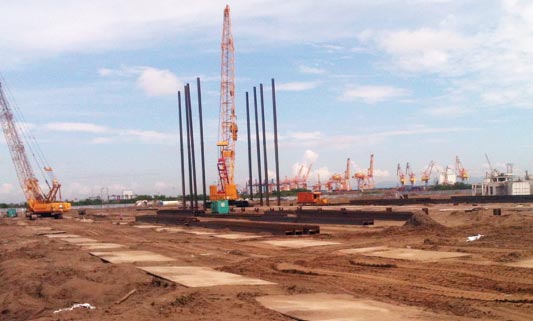
| Port set for 2017 launch | |
The developers of billion-dollar Lach Huyen international gateway port in the northern port city of Haiphong believe the port will begin commercial operations in 2017. Component A’s package 6 which had work started on it 16 months ago, is on schedule. “This package has surpassed 55 per cent of designated contract work volume,” said Tran Anh, director of Maritime Project Management Unit II under the Ministry of Transport’s (MoT) Vietnam Maritime Administration (VMA), the developer of component A. Package 6, slated to span 52 months, is being implemented by a consortium consisting of Japanese contractors Toa Corporation and Penta Ocean Construction Limited. This package, including building a solid embankment and part of the port’s foundations, is important to the entire project’s progress. “When this package is completed, the developer of component B - which includes construction of two container terminals valued at VND6.57 trillion ($313 million) - will kick-off construction,” said Nguyen Nhat, VMA’s director. Also according to VMA, package 10 involving building a jetty and an embankment is about to finish selecting contractors to become ready for deployment before the end of this year. A source from Haiphong International Container Limited (HICL), which is in charge of building the two initial container terminals belonging to component B, revealed that the selection of construction contractors is slated to be finalised early this month. “If component A completes its package 6 as committed, we will start construction from mid-2015, which is scheduled for completion two and half years later. HICL’s initial container terminals would start operation from late 2017,” confirmed an HICL executive. Investment partners confirmed that by September the joint venture parties had contributed $750,000 out of the total $40 million legal capital regulated in the investment certificate. VMA’s deputy director Do Hong Thai, when questioned about the progress of component A’s package 6, said that after the start of construction in July last year, the contractors had gradually handed over space to component B investors for survey and design activities. A thorny issue at the port project relates to channel dredging depth, as the Japanese want a 14 metre deep channel, whereas the Vietnamese are content with a depth of 13m. The MoT argued that the 13m deep channel for the port for the period from now until 2020 was suitable, but it had pledged to dredge the channel to a depth of 14m in the next five year phase (2021-2026), or in a case where the container terminals report 75 per cent design capacity use. With respect to HICL proposal on continuing building terminals 3 and 4, Deputy Minister of Transport Nguyen Van Cong said the MoT basically supported the company’s proposal on the condition its proposal was not worse than those coming from other investors at that point in time. When operational, Lach Huyen will be capable of handling 12.8-13.1 million tonnes of goods a year. The port will initially be able to handle 4,000-6,000TEU container ships when launching, increasing to 8,000TEU ships in successive phases (equivalent to 100,000DWT ships). | |
| VIR |
